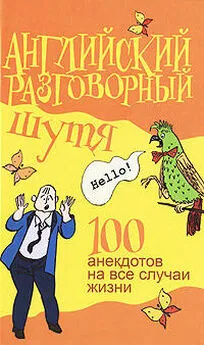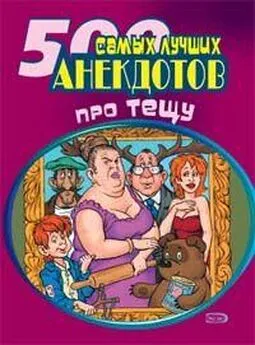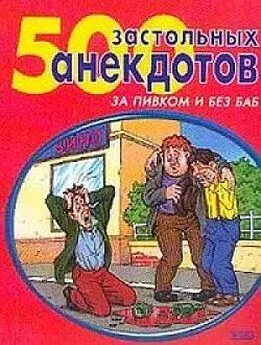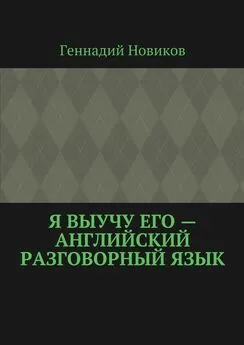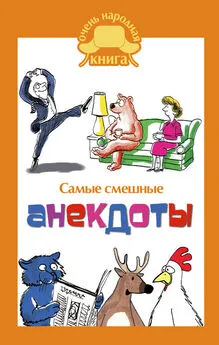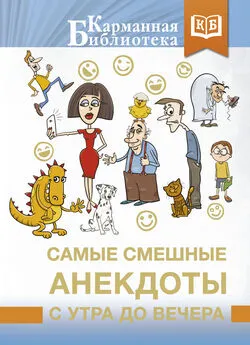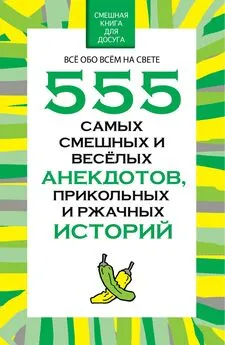Виктор Миловидов - Английский разговорный шутя. 100 самых смешных анекдотов на лучшие разговорные темы
- Название:Английский разговорный шутя. 100 самых смешных анекдотов на лучшие разговорные темы
- Автор:
- Жанр:
- Издательство:АСТ, Астрель
- Год:2010
- Город:Москва
- ISBN:978-5-17-064604-3; 978-5-271-26535-8
- Рейтинг:
- Избранное:Добавить в избранное
-
Отзывы:
-
Ваша оценка:
Виктор Миловидов - Английский разговорный шутя. 100 самых смешных анекдотов на лучшие разговорные темы краткое содержание
Учебное пособие, ориентированное на совершенствующихся в изучении английского языка, основано на современных англоязычных анекдотах и смешных историях. Занимаясь с пособием, читатель сочетает отработку лексико-грамматических и разговорных навыков с чтением текстов легкого, развлекательного жанра.
Тексты снабжены словарем, грамматическим комментарием и упражнениями с ключами.
Для всех, кто любит английский язык и хорошие шутки.
Английский разговорный шутя. 100 самых смешных анекдотов на лучшие разговорные темы - читать онлайн бесплатно полную версию (весь текст целиком)
Интервал:
Закладка:
1. How did Tom's wife look?
2. Was he much different?
3. What did he ask the minister about after the ceremony was over?
4. How did the minister estimate the cost of the wedding?
5. Why were Tom's numbers different?
2. Fill in the blanks with the words from the text:
1. Tom's wife wasn't very _______.
2. He was no, either _______.
3. How much is the _______ of the ceremony?
4. Give me what it is _______ to have this lady for your wife.
5. Tom _______ the minister $50.
6. The minister gave him $42.
3. Match the two parts of the sentences:

4. Match the words and expressions in the left column to those in the right one:
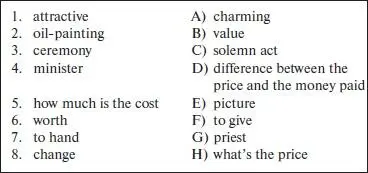
5. Translate from Russian into English:
1. После церемонии Том спросил священника, сколько это стоит.
2. Просто дай мне столько, сколько, как ты думаешь, стоит твоя жена.
3. Ты хочешь иметь эту даму в качестве жены?
4. Том посмотрел на жену и протянул священнику 50 долларов.
5. Священник посмотрел на жену Тома и дал 42 доллара сдачи.
В предложении Tom wished his wife were more attractive… используется одна из фразеологических конструкций, с помощью которых вводится сослагательное наклонение.
Проверьте свои навыки использования данных конструкций, в случае необходимости обращаясь к грамматическому комментарию (раздел 30,).
6. Translate from Russian into English:
1. Жаль, что я не живописное полотно.
2. Пора бы мне жениться.
3. Если бы только он сказал мне вчера, сколько это стоит.
4. Жаль, что вы дали мне так много денег.
5. Пора бы вам дать мне 42 доллара сдачи.
6. Если бы он только посмотрел на нее перед тем, как вести в церковь.
7. Find English equivalents to the Russian words in the scanword:

1. (w… ) желать, 2. (а… ) привлекательная, 3. (m… ) священник, 4. (с… ) сдача, 5. (а… ) позволять себе, 6. (s… ) ставить в тупик, 7. (с…) стоить, 8. (b…) кроме этого, 9. (у…) вопить, 10. (h… ) протягивать, давать.
8. Render the joke.
Section 28
Reverse roles
Mary was married to a male chauvinist. They both worked full time, but he never did anything around the house and certainly not any housework. That, he declared, was woman's work.
But one evening Mary arrived home from work to find the children bathed, a load of wash in the washing machine and another in the dryer, dinner on the stove and a beautifully set table, complete with flowers.
She was astonished, and she immediately wanted to know what was going on. It turned out that Charley, her husband, had read a magazine article that said that working wives could be more romantically inclined if they weren't so tired from having to do all the housework in addition to holding down a fulltime job.
The next day, she couldn't wait to tell her friends in the office. «How did it work out?» they asked.
«Well, it was a great dinner,» Mary said. «Charley even cleaned up, helped the kids with their homework, folded the laundry and put everything away.»
«But what about afterward?» her friends wanted to know.
«It didn't work out,» Mary said. «Charley was too tired.»
Study the words and expressions given below:
chauvinistшовинист
male chauvinistмужской шовинист; человек, отстаивающий права мужчин
to declareзаявлять to batheкупать
loadгруз
washстирка
dryerсушилка
stoveплита (газовая или электрическая)
to astonishудивлять, изумлять
magazineжурнал
articleстатья
to inclineсклоняться (к чему-л.)
to foldскладывать
laundryбелье для или после стирки
afterwardвпоследствии, потом
around the houseпо дому, в доме
full-time workработа на полный рабочий день (на ставку)
to set the tableнакрывать стол
complete with sthзаконченный, завершенный (чем-л.)
to turn outявляться, неожиданно появляться, оказываться
in additionв дополнение
to hold downосуществлять, придерживаться, выполнять
to work outполучаться, осуществляться
to clean upубирать со стола
to help sb with sthпомогать кому-л. в чем-л.
1. Answer the questions to the text:
1. What sort of a man was Mary married to?
2. Why didn't he do any work around the house?
3. Why was Mary astonished when she arrived home one evening after work?
4. What made Charley do all the work about the house and, in addition, cook a dinner?
5. What didn't work after all, and why?
2. Fill in the blanks with the words from the text:
1. They both worked _______ time.
2. Housework, he _______, was woman's work.
3. Mary found the children _______.
4. A load of _______ was in the dryer.
5. She was _______ .
6. It _______ that Charley had read a magazine article.
7. Working wives could be more _______ inclined if they weren't so tired.
8. They had to do all the housework into holding down a full-time job.
9. Charley helped the _______ with their homework.
3. Say if the statement is true or false:
1. He always did everything around the house and certainly all the housework.
2. One evening Mary arrived home from work to find the children bathed.
3. She immediately wanted to know what was going on.
4. The next day, she couldn't tell her friends in the office about it.
5. Well, it was a great breakfast.
6. Charley cleaned up and helped the kids with their homework.
4. Match the words and expressions in the left column to those in the right one:
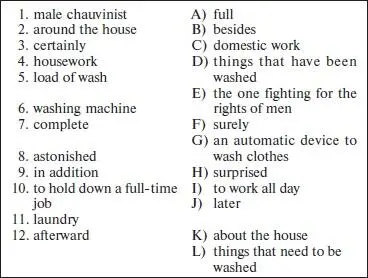
5. Translate from Russian into English:
1. Он никогда не делал ничего по дому.
2. Мэри приехала домой с работы и обнаружила, что стиральная машина загружена.
3. На плите был обед, а стол был прекрасно сервирован и украшен цветами.
4. Она немедленно захотела узнать, что происходит.
5. В статье говорилось, что работающие жены могли бы быть более романтически настроенными.
6. Кроме того, у нее была работа на полный рабочий день.
7. Она не могла дождаться, когда расскажет своим приятельницам в офисе.
8. А что было потом?
В предложении The article said that working wives could be more romantically inclined if they weren't so tired from having to do all the housework… сослагательное наклонение основано на использовании глагола could в первой части предложения.
Кроме глагола could, в подобного рода конструкциях может использоваться глагол might. При этом изменяется значение конструкции.
Проверьте свои навыки использования данных глаголов; при необходимости обратитесь к грамматическому комментарию (раздел 31).
6. Translate from Russian into English:
1. Если бы он любил свою жену, он делал бы работу по дому.
2. Если бы она не уставала так на работе, она могла бы быть романтически настроена каждый день.
3. Если бы она приехала с работы раньше, у него не было бы времени сделать всю работу по дому.
4. Если бы у них были бабушка или дедушка, они могли бы присматривать за детьми.
5. Если бы он не прочитал этот журнал, он вряд ли приготовил бы обед.
6. Если бы он не устал, это бы сработало.
7.Turn the sentences into Active:
1. All the housework is done by Mary.
2. The children were bathed by the husband.
3. The table has been laid by Charley.
4. Mary was astonished by what she saw.
5. The laundry is being folded by Mary herself.
8.Render the joke.
Section 29
We fight so much
Two Yuppettes were shopping. When they started to discuss their home lives, one said, «Seems like all Alfred and I do anymore is fight. I've been so upset, I've lost 20 pounds.»
«Why don't you just leave him then?» asked her friend.
«Oh! I'd rather not,» the first replied. «Not yet. I'd like to lose at least another fifteen pounds first.»
Study the words and expressions given below:
Читать дальшеИнтервал:
Закладка:
